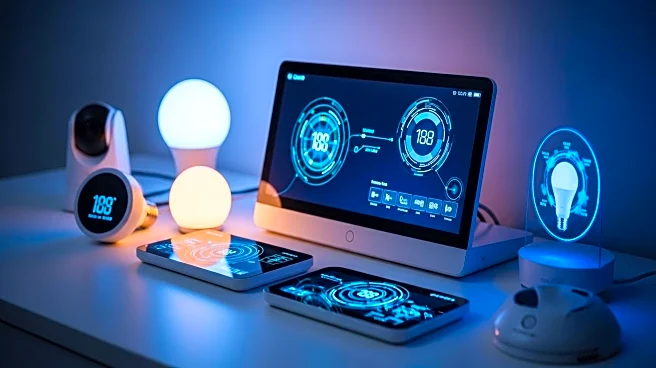What is the story about?
What's Happening?
Smart home technology is transforming daily life by connecting various home devices into a single network that can be controlled remotely. This includes integrating systems like security, HVAC, lighting, and personalized weather systems, all accessible through smartphones or voice assistants like Google Assistant or Siri. The technology offers convenience by streamlining chores and providing a healthier living environment through devices like smart air purifiers and thermostats. As smart homes become more popular, they offer practical benefits such as enhanced security, energy efficiency, and personalized living experiences.
Why It's Important?
The rise of smart home technology is significant as it provides practical solutions to improve the quality of life for homeowners. By automating daily tasks and optimizing energy usage, smart homes contribute to cost savings and environmental sustainability. Enhanced security features offer peace of mind, while personalized settings allow homeowners to tailor their living environments to their preferences. As technology continues to advance, smart homes represent a shift towards more efficient and convenient living, reflecting broader trends in consumer behavior and technological innovation.
What's Next?
As smart home technology evolves, we can expect further integration with emerging technologies such as artificial intelligence, which will enhance the ability of smart systems to learn and adapt to user behaviors. The development of interoperability standards will facilitate seamless communication between devices from different manufacturers, expanding the possibilities for smart home automation. Additionally, advancements in data security and privacy measures will be crucial to address concerns related to unauthorized access and data protection, ensuring the safe and reliable use of smart home systems.
Beyond the Headlines
The widespread adoption of smart home technology raises ethical and legal considerations, particularly regarding data privacy and security. As these systems collect and share personal data, it is essential to establish clear guidelines and regulations to protect consumer information. Furthermore, the integration of smart home technology into everyday life may lead to cultural shifts, as individuals become more reliant on technology for managing their living environments. This reliance could impact social interactions and lifestyle choices, highlighting the need for a balanced approach to technology use.
















